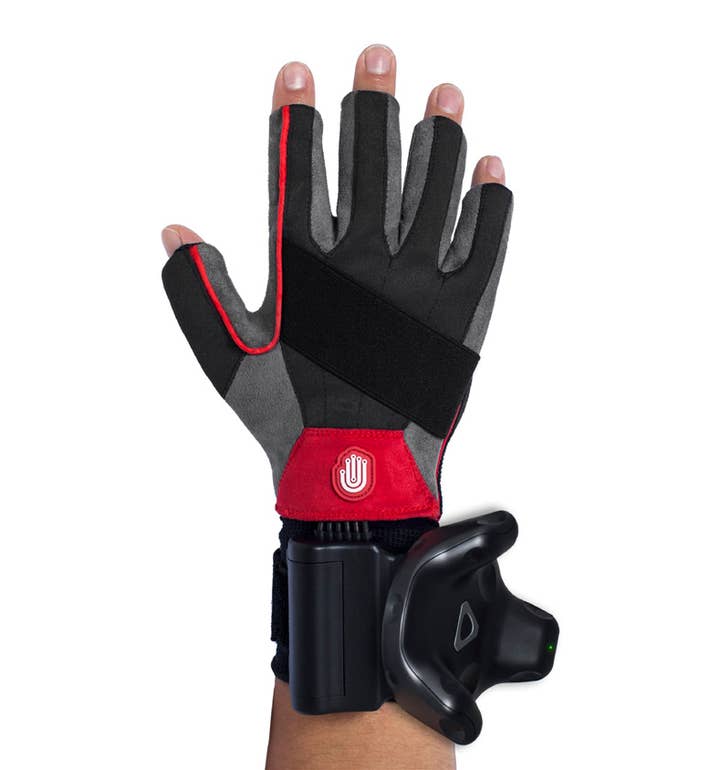VR's Minority Report moment is almost here
Weekly roundup: As the news cycle heats up in 2017, VR once again is in the spotlight with Vive aiming to make a splash
Although there's plenty of newfangled tech always revealed at CES at the start of every year to make geeks like us drool, most of the time the devices on display are tangentially related to the games business at best. In the slow build to the news cycle this week coming back from a holiday break, the one CES announcement, however, that made us take notice was HTC Vive's ViveTracker, which is slated for release in the second quarter of this year.
Why is this potentially so exciting? The 4-inch wide device can be mounted to just about any accessory or real-world object. That means baseball bats, tennis rackets, toy guns, toy swords, etc are now all possible objects that can be used in a VR space. Indeed, HTC has lined up eight partners to manufacture ViveTracker-compatible accessories.
More tantalizing than objects in VR is the ability to wear a haptic glove to offer genuine hand-tracking. As much as the Vive controllers and the newly released Oculus Touch controllers offer a respectable way to mimic real-world gestures (and I'd give the edge to Touch in that respect), clicking a button or squeezing a trigger to grab an object isn't the same as just moving your hand and fingers completely naturally. Along with locomotion, true hand-tracking is one of the key aspects of immersive VR, and that moment in Minority Report where Tom Cruise manipulates a virtual screen while wearing a pair of gloves could soon be a reality with the ViveTracker.

The business potential to give the VR ecosystem a boost is worth noting as well. It's easy to envision all sorts of third-party peripherals that will seek to take advantage of the ViveTracker. As Daniel O'Brien, GM, US and EMEA, Vive, commented, "The Vive Tracker is the first step in growing an ecosystem of third-party accessories that will change how we interact with virtual experiences and provide consumers and businesses with an unlimited amount of content opportunities."
HTC has yet to announce a price for the tracking device, but it does intend to give away 1,000 of them to developers to encourage support and to get game and app makers' creative juices flowing. If HTC is smart, it will soon bundle in the ViveTracker as a standard part of the complete Vive package.
Another potentially interesting announcement to come from the folks at HTC was the subscription offering it's planning for the Vive. Much like on mobile, discoverability is already becoming an issue in the world of VR content storefronts, and when the installed base of VR is currently as low as it is, the problem is only compounded for the average VR developer. Getting your game or app to be included in a subscription package could help alleviate that problem. "We want to give VR developers as many ways as possible to monetize and feature their content, and this is yet another channel for them to reach new customers on Viveport," noted HTC Vive boss Rikard Steiber.
Of course, the devil is in the details, and while HTC is promising a low cost, the subscription plan needs to be priced appropriately or it will never reach the levels needed to make it attractive to developers in the first place.
Along with the upcoming third-party wireless solution for the Vive, the Vive Deluxe Audio strap, new B2B app stores and its Viveport Arcade ambitions across China and the rest of the world, it's clear that HTC is aiming to have a bigger impact on the VR business in 2017. It'll be interesting to see what new developments may be coming from the Oculus and PlayStation camps this year as well. More innovation in both content and hardware is going to be necessary to drive the market if 2017 is going to become "The Year of VR" 2016 was supposed to have been.
And while none of the high-end VR headsets have come even close to one million units sold, the mobile space is starting to accelerate. Gear VR has sold 5 million units and estimates for Google's Daydream put the mobile VR headset around 14 million in the next few years. Even if 2017 isn't the kind of year those in the VR space would like to see, odds are the technology will survive in some fashion.
Other news on GamesIndustry.biz this week:
Apple: App store devs earned $20 billion in 2016
Global PlayStation 4 sales pass 53m
Inside, Firewatch, Overwatch and Uncharted 4 lead GDC Awards noms
Pixelmage Games closes before completion of Hero's Song
Super Mario Run generates $30m in two weeks - Newzoo
Rhianna Pratchett parts ways with Tomb Raider
Hearthstone devs reluctant to make community videos for fear of harassment
Ladykiller in a Bind to launch "fully unedited and uncensored" on Steam
